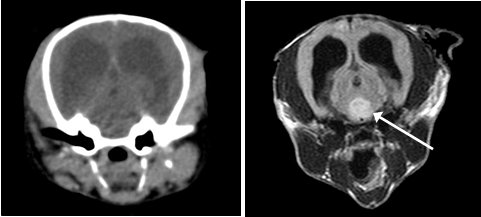Equine Performance and Rehabilitation -
The Equine Performance Medicine and Rehabilitation Center (EPMRC) at the University of Tennessee Veterinary Medical Center (UTVMC) encompasses both clinical rehabilitation and education. Clinical services are provided by our team of veterinarians who are board-certified surgeons, licensed and certified veterinary technicians and veterinary assistants.
EPMRC adds an exciting new dimension to the UT Equine Hospital that closes the circle on creation of the concept of “total patient care”. The new rehabilitation center contains the expertise, resources, and equipment to manage patients that benefit from physical therapy, adjunctive treatments, and exercise conditioning. This unit includes a full sized indoor riding arena, a lameness examination area with multiple surface types for lameness diagnosis during exercise; a resistance free walker for controlled, untethered exercise; underwater treadmill for exercise with resistance but reduced body weight; equine salt water spa with hydrotherapy for treatment of swelling, inflammation, and soreness; podiatry center with a hot forge and dedicated farrier to provide routine and therapeutic shoeing for lameness, postoperative management, limb diseases, and routine hoof care. Additionally, a dynamic video endoscope will allow for the diagnosis of upper airway disease in the horse while it is being ridden or during treadmill therapy.
Rehabilitation modalities include:
- Acupuncture
- Chiropractic
- Cryotherapy
- Solarium (ultraviolet and heat therapy)
- Hyperbaric oxygen therapy (HBOT)
- Low-level laser therapy
- Neuromuscular electrical stimulation
- Shockwave therapy
- Pulsed electromagnetic therapy
- Therapeutic exercise
- Therapeutic ultrasound
- Underwater treadmill
- Saltwater spa
- Conditioning program
To monitor a patient's progress, horses are assessed at regular intervals using video motion analysis. Most horses derive significant benefit from a period of physical rehabilitation following major surgery or injury to achieve a quicker and more complete return to function.
The Equine Performance Medicine and Rehabilitation Center is also supported by a new state of the art diagnostic imaging facility which houses MRI, CT, and nuclear scintigraphy for large and small animals. The EPMRC is integrated with complimentary therapies including hyperbaric oxygen therapy, regenerative medicine, chiropractic, and acupuncture. These services and more make this one of the most comprehensive centers for the diagnosis, treatment, and rehabilitation of horses in the world.
What is Magnetic Resonance Imaging (MRI)?
MRI is an imaging method based principally upon sensitivity to the presence and properties of water (more precise: mobile hydrogen protons). “Water” is present in abundance in the body, making MRI a useful tool in assessing physiologic and pathologic processes.
In MR terminology “water” describes both “free water” (liquids like urine, CSF, cystic fluids) and “bound water” (intra- and extracellular fluid in tissues). Pathologic processes change the water content and properties in tissues. Examples include cysts or abscesses (i.e. cavities containing free water), edema (i.e. increase in water content of tissue), inflammation and neoplasia (i.e. presence of cells that normally would not be present).
MRI is very sensitive in picking up these abnormalities in water distribution and composition.
Images are created by subjecting the patients to a magnetic field and monitoring the behavior of tissues in this environment. MRI does not involve radiation, and is therefore considered a very safe imaging modality.

These are computed tomographic and magnetic resonance images of the brain in the same dog. The MR image (right) shows a lesion in the brain parenchyma (arrow), which is not evident on the CT image (left)
The University of Tennessee Veterinary Medical Center's Radiology service offers a full line of diagnostic services including:
- general diagnostic radiology
- radiographic special procedures
- ultrasound (including color flow Doppler)
- computed tomography
- magnetic resonance imaging
- nuclear medicine
- Iodine-131 Therapy
Approximately 11,000 imaging studies are performed annually. The majority of patients are dogs, cats, and horses. A large number of exotic and zoo animals are also evaluated.
Our radiology service supports patients of the Veterinary Medical Center as well as outpatient imaging to referring veterinarians for select advanced imaging.
The radiology section provides clinical training in veterinary radiology during the third and fourth years of the professional curriculum. In addition, the radiology section has a residency training program accredited by the American College of Veterinary Radiology.
Nuclear Medicine
UTVMC Veterinary Imaging Services enables regional veterinarians to maintain primary care over their patients, yet provides easy access to a specialized diagnostic modality which represents the imaging standard for evaluation of a variety of neurological, musculoskeletal, medical and oncologic disorders. The outpatient MRI and CT clinic provides you, the veterinarian, easier access to our expertise and technology. Please visit our website at www.utvetmri.com, email This email address is being protected from spambots. You need JavaScript enabled to view it. or call (865) 974-5601 for more information.
Equine Performance and Rehabilitation - https://vetmed.tennessee.edu/vmc/EquineHospital/EquinePerformanceRehab/Pages/default.aspx
MRI - http://www.utvetmri.com/what-is-mri.php
Nuclear Medicine - https://vetmed.tennessee.edu/vmc/radiology/Pages/Home.aspx

